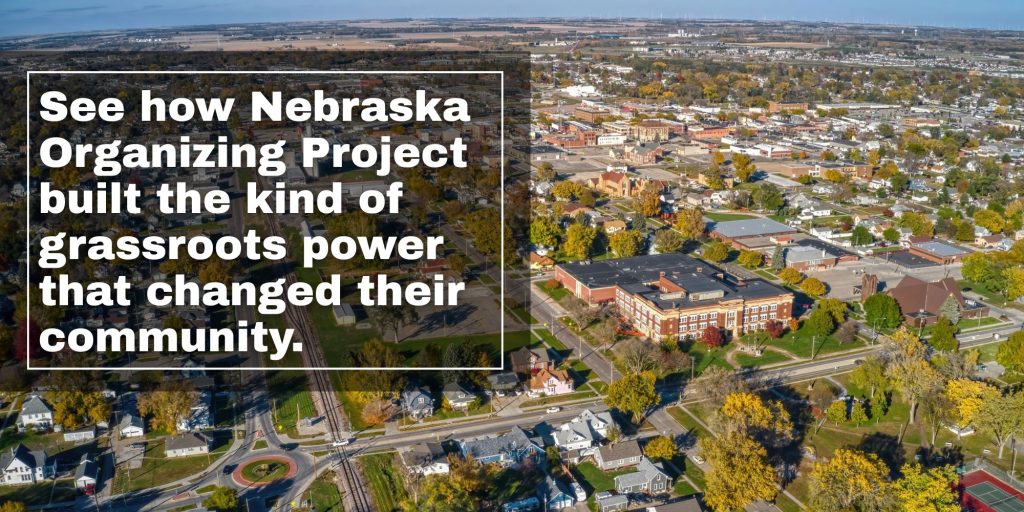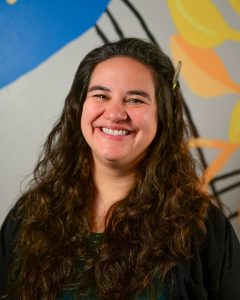Aerial view of Norfolk, Nebraska.
Nebraska Organizing Project harnessed the power of grassroots organizing to bring language access, and profound change, to a rural community.
This article first appeared in the Western Organizing Review.
By Jessica Plance
The room was buzzing as over fifty community members sat in the Norfolk City Council chamber, awaiting a decision that had been months in the making. They had shared their stories, knocked on doors, built relationships, and stood together to push for a simple yet fundamental right: language access. As city officials prepared to cast their votes, the weight of the moment was clear. This was more than just a policy decision; it was a test of the power of grassroots organizing.
Language access ensures that non-English speakers can access emergency and other essential services, participate in their local government, and communicate effectively with officials. It improves public safety, strengthens civic engagement, and fosters inclusivity. Even English-speaking residents benefit from a more informed and engaged community, as language access helps create stronger connections between neighbors, businesses, and local institutions.
“Everyone who’s in it with us recognizes that their well-being is tied up in the well-being of their neighbors,” explained Anneka Rameriz, Norfolk resident and director of the Nebraska Organizing Project (NOP). “If my neighbor is not safe, I am not safe.”
Moreover, providing language access is not just good policy—it’s a legal requirement under Title VI of the Civil Rights Act of 1964, which prohibits discrimination based on national origin, including policies or practices that create barriers for individuals with limited English proficiency. Language access aligns with federal law and reflects a commitment to equity, ensuring that every resident, regardless of their background, has a much greater opportunity to thrive.
An organization is born
NOP was born from the belief that real change happens when communities come together to build power. With support from WORC and the Great Plains Conference of the United Methodist Church, NOP took root in Norfolk, a rural town with a growing, diverse population.
To get NOP started, Kevin Williams, a WORC senior advisor, did an assessment of Nebraska. He had conversations with some 75 people in the state to get a lay of the land and find out, among other things, what challenges they were facing and what the political landscape was like.
Based on these conversations, WORC decided it would help build a state-based organization, starting with a local community. Two WORC organizers, Hannah Bohacek and Alina Lopez, had 50 more conversations with community members to continue to gather a local perspective on the issues. The first of these one-on-one conversations was with Norfolk resident Mo Bailey.
Bailey had already been active in the community with a background in faith-based organizing and a deep belief in the power of relationship-building. She became one of NOP’s community leaders and helped lay the foundation for the organization’s approach—centering people’s stories and equipping community members with the tools to advocate for themselves.
“The heart of organizing is listening. People want to be heard, but they also want to know they have the power to make change,” Bailey said.
She climbed the leadership ladder. After serving as a community leader, she became an organizer and later NOP’s director. She worked closely with local residents to continue to build power, ensuring they felt prepared to step into leadership roles. She demystified the political process and emphasized the strength found in collective action. Bailey eventually harnessed her experience as NOP’s director to become the leadership and capacity organizer at WORC, with Ramirez stepping in as the new director of NOP.
Identifying the Need
After forming, NOP conducted 150 more one-on-one conversations in Norfolk. One issue kept surfacing: language barriers, which were preventing many people from accessing basic city services.
“We had people in our community who couldn’t even call 911 and get help in their own language,” Ramirez said. “We have children in our community who are interpreting for their families in crisis situations. That’s unacceptable.”
Keep up to date with grassroots organizing in the West with WORC’s newsletter.
From these conversations, the group realized that advocating for a citywide language access plan would have a profoundly positive impact. Armed with training from WORC, the organizers learned how to turn community concerns into strategic action. They mapped out key decision-makers, built alliances, and prepared to make their case before the city council.
Building a Movement
The Norfolk chapter of NOP started small—just a handful of passionate community members determined to create change. They understood that personal stories held power, so they made storytelling a central part of their organizing.
Community organizing gives people a path forward. A pastor’s wife, who once believed she wasn’t political and had nothing to contribute, became an incredibly effective recruiter, bringing in more community members than anyone else at NOP. A young Latina woman, who had resigned herself to the way things were because she saw no clear path to change, emerged as the leader of the Norfolk chapter. She stood before the city council and spoke in the language of her heart, finally feeling heard and seen in her own community.
“People shared their stories—what it felt like to be unheard, unseen. That’s what made the city council listen.”
-Mo Bailey
Their transformation proves that power lies in the hands of those who least expect it, and when people organize together, they can reshape their communities in ways they never thought possible.
“There have been times when we thought progress had been made because a policy had changed and as easily as it has changed, it has changed back,” Bailey said. “What I believe I have seen in Norfolk is people’s lives being transformed. I have seen some of our members who aren’t going back to the way that they used to see the world.”
Residents, both English and Spanish-speaking, prioritized language access as the top issue due to its widespread and immediate impact. Interviews with city officials, including the fire chief, police chief, and director of administrative services revealed that current translation practices—such as relying on Google Translate or untrained volunteers—were inadequate, placing both residents and city staff at risk.
Further research uncovered critical gaps: essential documents were not translated, emergency services were strained, and residents with limited English proficiency faced significant barriers to accessing city services. Furthermore, the city’s practices were found to be in noncompliance with Title VI of the Civil Rights Act, which prohibits discrimination based on national origin. Cities not in compliance risk losing federal funding.
With nearly 10% of Norfolk’s population speaking Spanish and over 5% reporting limited English proficiency, the research brief NOP completed outlined a series of targeted solutions, including adopting a comprehensive language access plan, hiring a dedicated language navigator, providing consistent staff training, and ensuring the use of certified translators.
Those months of organizing revealed that Norfolk was in need of a language access plan to ensure all residents could fully participate in their community. Leading up to the city council vote members felt confident that they proved a strong case and that the vote would pass. What they didn’t know was just how supportive the councilors would be.
The Final Vote
The night of the city council vote was a defining moment for NOP. Organizers and community members filled the chamber, prepared to present their case one last time. As resident after resident shared testimony, city officials could no longer ignore the urgent need for change. When the vote finally passed in favor of adopting the language access plan, the vote was unanimous. The room erupted in celebration.
“I had the honor of introducing the [Language Access Plan] in Spanish—the language of my heart,” said NOP member Tania Garcia. “It was my first time at a city council meeting, and sharing our work in Spanish filled me with deep pride. The unanimous approval of the LAP was a victory for our community, proving that Spanish, and all languages, belong in decision-making space.”
“That moment, when the council said yes, we knew we weren’t just individuals anymore—we were a force.”
-Anneka Rameriz
“I never [before] in my life have been to meetings where I learn something, do something, and walk away feeling so proud of what we just accomplished,” said Julie DeFor, another NOP member.
In addition to the new policy, one of the most significant outcomes of the language access victory in Norfolk was the creation of a new city staff position dedicated to language navigation. What was originally an HR generalist role was amended to focus specifically on helping non-English-speaking residents access city services.
To ensure the role would be impactful, NOP formed an advisory group that worked closely with the city’s human resources department. This group advocated for a qualified, bilingual candidate to fill the position and helped shape the hiring process. After the language navigator was brought on, the advisory group continued to play a key role by supporting the new staff member’s orientation and integration into the community. Their continued engagement shows how grassroots organizing doesn’t end with a policy win—it ensures that victories are implemented in meaningful, lasting ways.
Expanding the Movement
NOP success in Norfolk demonstrated a powerful model for organizing in rural communities. By investing in leadership development and deep relationship-building, NOP aims to create a network of grassroots leaders who could drive change across Nebraska.
With their first major victory secured, the NOP immediately set their sights on expanding the work to South Sioux City, where a group of dedicated organizing committee members are currently working with staff to create a local chapter. Plans are also underway to establish a statewide organizing committee to provide leadership and long-term sustainability.
“We’re not just solving problems—we’re building power that lasts,” Bailey said.
Learn more:
Western Native Voice’s Lobby Days Brings Indigenous Grassroots Advocacy to the Montana Legislature

“Yes, I want to help WORC elevate Western voices and hold decision-makers accountable!”







